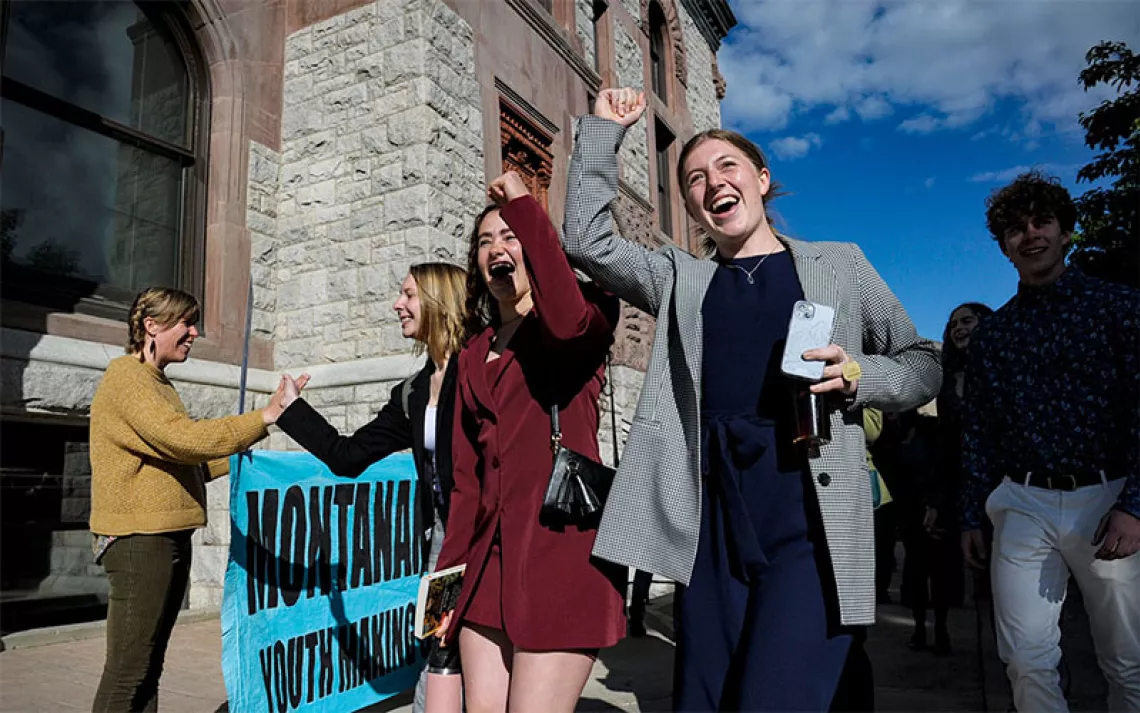All Politics Is Not Local
Conservative state legislatures are acting aggressively to preempt local ordinances

Photo by xochicalco/iStock
In 2014, the city of Denton, Texas, decided it was going to outlaw one of the fastest-growing industries in the state—the gas-extraction industry, which had drilled hundreds of hydraulic fracturing wells around Denton to draw fuel from the Barnett Shale, one of the largest fossil fuel reserves in North America. Many of the extraction wells were built within 200 feet of city parks, schools, and hospitals, in clear defiance of a local ordinance that mandated setback distances of at least 1,000 feet. Concerned about the wells’ impacts on public health—as well as their accompanying loud noise and foul odors—residents concluded that the gas companies were not interested in following local laws, so they launched a grassroots campaign to ban fracking at the ballot box.
It was truly a David versus Goliath kind of battle. “We were outspent 20-to-1 by the opposition, which was bankrolled by big oil and gas companies,” says Adam Briggle, a professor at the nearby University of North Texas.
Despite pumping some $700,000 into defeating the local initiative, the oil and gas industry lost. In an unprecedented victory that earned national headlines, Denton voted overwhelmingly—58 percent in favor to 41 percent against—to ban natural gas extraction within the city limits. But the win was short-lived.
Within hours of the measure’s passage, the Texas Oil and Gas Association and the Texas General Land office, a state agency, sued the city to halt implementation of the measure. The following year, the Texas legislature stepped in to overrule the Denton initiative. It passed a law that would prohibit all local governments in Texas from regulating the oil and gas industry. The gas companies were given a green light to once again perform hydraulic fracturing in Denton, regardless of what the local residents thought of the practice.
“They used state law to nullify the voice of the people,” Briggle says.
The fight in Denton was just one battle in a larger war between local and state governments over who has the ultimate say in how—or whether—to set environmental and public health standards. These fights have pitted progressively minded local officials who are seeking to respond to the concerns of their electorate against more politically conservative state officials who, critics say, appear more interested in defending the interests of big corporations. Often, these political battles hinge on what’s known as preemption: The governing principle that is baked into the US federalist system that says national laws take precedence over state laws, and that state laws trump municipal and county laws. While preemption laws like the one that struck down Denton’s anti-fracking initiative have long been a part of the US governance system, only within the past decade have they assumed an insidious ideological dimension.
“These are cases where the state affirmatively reached out to either undo a local law or prevent local governments from acting in a certain area,” says Richard Briffault a professor of law at Columbia Law School who coined the term “the New Preemption” in a 2018 paper. “They’re more intentional now.”
The New Preemption raises questions about civic responsibility and ultimate political authority in an age of climate change, regulatory capture, and political deadlock. By stifling grassroots-driven policy change, preemption laws have forced a wedge not only between cities and states but also between local governments and the communities they’re meant to serve. By overruling and, at times, punishing local initiatives, the new raft of preemption laws raise the question: Should local governments exist merely within the vacuum of higher authority, even when higher authorities are disinclined to act on issues whose impact lands, first and foremost, at the community level?
The New Preemption
Since 2010, 14 state legislatures have passed laws preempting local governments from passing bans on single-use plastic bags and straws. Five states, including Texas, have preempted local bans on hydraulic fracking, and Florida is now considering a similar law. As many as 43 states have some sort of preemption on the books that limit municipalities from regulating the use of pesticides. And these are just examples of environmental preemption. Some argue the trend is far worse when it comes to labor laws, firearms regulation, sanctuary cities for undocumented immigrants, and transgender rights.
The prevalence of state preemption laws often mirrors geopolitical divides, with Republican-controlled legislatures countermanding the progressive agendas of Democrat-run cities. In almost every case, ultimate authority rests with the higher level government. Once a judge rules on the constitutionality of a local ordinance or a state legislature supersedes a municipal or county law, the preempted locality has no legal recourse. “The bottom line is that local governments are agents of the state,” says Sarah Schindler, professor of law and associate dean for research at the University of Maine School of Law. “They are created by the state, and if the state wanted to, it could get rid of local governments entirely.”
The idea of local governments existing at the pleasure of state legislatures dates back to the 19th century. After the Civil War, Southern states began following a legal doctrine known as “Dillon’s Rule” in an effort to combat the municipal expansion of voting rights to include African Americans. Dillon’s Rule said local governments only have powers that are expressly granted to them by the state or federal government. According to a study by the National League of Cities, a majority of state charters still follow that dictum.
What’s unique about recent trends in state preemption is the degree to which these laws are explicitly designed to advance the agenda of corporate interests. Whereas the post–Civil War South used preemption laws to uphold white supremacy and private property rights, the New Preemption uses them to uphold corporate power.
“Industry doesn't want to be regulated,” says Kim Haddow, director or the Local Solutions Support Center, an advocacy group that works to counter the overreach and misuse of preemption laws. “Conservatives are all in favor of not regulating, so it's a sort of marriage made it hell.”
Many preemption laws are written by the industry—literally. The Koch-funded American Legislative Exchange Council (ALEC) issues legislative templates to state lawmakers who are interested in drafting environmental legislation. One of the most commonly used templates is called “State Withdrawal From Regional Climate Initiatives,” which has served as the legislative blueprint for a number of state bills designed to abandon interstate efforts at carbon pollution reduction.
Another ALEC-written template is designed to preempt local pesticide ordinances. The language of that template can be found in 29 state laws with nearly identical laws preempting pesticide bans. ALEC has also worked with the American Progressive Bag Alliance, a front for the plastics industry, which has provided legislative templates for plastic-ban preemption bills in dozens of states.
In Texas, the state law that struck down Denton’s fracking ban placed regulatory authority in the hands of the Texas Railroad Commission, an agency whose sitting members have received millions of dollars in funding from the industry they are meant to be regulating.“We are looking at a world where legislatures are directly and disproportionately affected by corporate lobbying,” Haddow says. “And it has a hugely demoralizing and depressing effect on local democracy.”
Haddow says that the mere prospect of a state preemption law can have a chilling effect, as local lawmakers are reluctant to sign off on new ordinances because they’re worried it will trigger preemption. But such a retreat can expose lawmakers to the wrath of voters who see their voices being eroded by corrupt or ineffectual politicians—an anti-democratic narrative that itself serves the interests of the same corporate donors who funded the preemption laws in the first place.
Citizens United
The New Preemption can be traced back to the US Supreme Court’s landmark Citizens United ruling of January 2010, which freed corporations to spend as much money as they’d like on political campaigns. Around that time, the Republican Party adopted an electoral strategy called REDMAP, which relied on redistricting to increase Republican control of Congress, governorships, and state legislatures. Citizens United allowed business groups, through political action committees, to pour unprecedented amounts of money into those races. The project culminated in the 2010 mid-term elections, during which Republicans gained control of 53 state legislative chambers. By 2016, the party would pick up an additional 13 governorships and 816 state legislative seats.
“Once they had [control], we saw this huge spike in the use of state preemption,” Haddow says. The new laws weren't moving policy remedies; they were merely handcuffing the localities who were. “So what you actually have is what we call a preemption vacuum, where the cities are handcuffed and can't act, and the states have no intention of acting.”
Despite its antidemocratic tendencies, preemption is not always bad. The Civil Rights Act of 1964, for example, was a form of federal preemption. It established a minimum standard of liberties below which no local or state government could fall. According to critics of the New Preemption, this is the ideal use of preemption—to establish a legal floor that local governments can then expand upon. Even Adam Briggle, who saw the voice of his community quashed by state preemption, acknowledges its occasional value. “You can’t have a city decide that they’re not going to treat any class of people with fewer rights than some other class,” Briggle says. “If local control is a qualified good then preemption is also a qualified good.”
The problem is that the New Preemption does not follow this structure of establishing a legal baseline. Many of the new preemption laws are anticipatory, revocatory, and in some cases punitive. In 2016, for example, the state of Arizona passed a law that promised to withhold revenue from any municipality that passed regulation deemed to “violate state law or the constitution of Arizona.” Kentucky passed a similarly punitive law in 2012 that criminalized the attempt to pass of any law that is already preempted under state law, effectively threatening local lawmakers with jail time.
Who Has the Power?
Perhaps the most insidious aspect of the New Preemption is how it undermines grassroots politics by robbing communities of their democratic prerogatives. As Briggle points out, local government is where citizens can most easily interact with official institutions of power. State and federal legislators, he says, often don’t know you and aren’t responsive to you in the same way local elected officials are. “For people living in an area, what matters is the place—the air they breathe, the water they drink, the safety of the playgrounds for their kids,” Briggle says. Local politics often involve the question, What defines this place? “Is it a place where people live?” Briggle asks. “Or is it a node on a network of production and consumption? And the node-on-a-network view of things is the more powerful and moneyed view, because those networks are what accumulate capital and wealth and power. And the people who see it as a place are usually without much of any of those resources. I think that’s what’s at stake—who has the power?”
Since the fracking ban in Denton was overturned, gas companies possess all the legal authority they need to extract gas there. The city is—true to the doctrine of Dillon’s Rule—at the whim of the state. But the grassroots campaign that Briggle helped spearhead cannot be called a failure. According to Briggle, not a single new fracking permit has been issued in the city of Denton since the ban was overturned—even as wells proliferate elsewhere across the Barnett Shale.
“Maybe the ban actually still kind of works,” Briggle says, “because the industry has lost their social license to operate here, and they recognize that.”
Even in the face of state preemption, it seems, the social pressure of grassroots politics has a power of its own—one that can compete with the endless coffers of private industry.
 The Magazine of The Sierra Club
The Magazine of The Sierra Club



